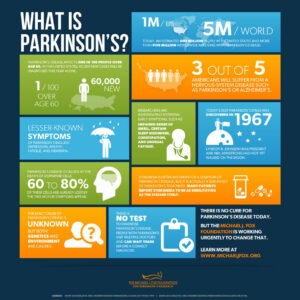 Parkinson’s Disease (PD) is a progressive neurological disorder that affects movement control. It occurs when nerve cells in the brain, specifically those producing dopamine, begin to deteriorate. As a result, individuals with PD experience symptoms such as tremors, stiffness, and difficulty with balance and coordination.
Parkinson’s Disease (PD) is a progressive neurological disorder that affects movement control. It occurs when nerve cells in the brain, specifically those producing dopamine, begin to deteriorate. As a result, individuals with PD experience symptoms such as tremors, stiffness, and difficulty with balance and coordination.
The incidence of Parkinson’s disease (PD) varies across different age groups, with the risk generally increasing as individuals get older. It’s important to note that while age is a significant factor, Parkinson’s disease can affect people of all ages. However, the majority of cases are diagnosed in older individuals, most people are diagnosed with PD around the age of 60, and the incidence continues to rise with advancing age.
Some individuals are diagnosed with Parkinson’s at a younger age, before the age of 50. This is referred to as young-onset Parkinson’s disease (YOPD). The Michael J. Fox Foundation states that approximately 4-10% of individuals with Parkinson’s are diagnosed before the age of 50.
While Parkinson’s can be challenging, it doesn’t mean an end to an active and fulfilling life. Several strategies and lifestyle modifications can help individuals with PD manage their symptoms and maintain a high quality of life.
- Exercise is Key:
Engaging in regular physical activity has been shown to improve mobility, balance, and overall well-being in people with Parkinson’s. Activities like walking, swimming, and yoga can be particularly beneficial. According to the Michael J. Fox Foundation, exercise helps release dopamine, the neurotransmitter deficient in PD, and can slow down the progression of the disease. There are several local options for managing Parkinson’s with exercise:• Fitness Classes at Senior Services – Tai Chi, Zumba, Yoga, Pilates, Fall Prevention, Balanced in Motion, Bonesavers and more!
To help manage the symptoms of PD, your exercise program should include these key components: aerobic activity, strength training, balance, agility & multitasking, and flexibility. Check out the calendar online at – SeniorServicesMidland.org/fitness-calendar or call 989-633-3700 to get started.• Rock Steady Boxing Class – Available at Greater Midland Community Center in the lower level.
Rocky Steady Boxing gives people with Parkinson’s disease hope by improving their quality of life through non-contact boxing based fitness curriculum. Recent studies, most notably at Cleveland Clinic, focus on the concept of intense “forced” exercise, and have begun to suggest that certain kinds of exercise may be neuro-protective, i.e., actually slowing disease progression. To learn more contact Rock Steady Boxing Mid Michigan at 989-486-1154 or email at rocksteadymidmich@charter.net. - Occupational and Physical Therapy:
Therapies tailored to the specific needs of individuals with Parkinson’s can significantly enhance daily functioning. Occupational therapy focuses on daily activities, while physical therapy addresses movement and mobility issues. Both can help manage symptoms and improve independence. - Medication Management:
Proper medication management is crucial in controlling Parkinson’s symptoms. It’s important for individuals to work closely with their healthcare providers to find the right medication regimen and dosage that works for them. - Nutrition and Hydration:
Maintaining a balanced diet and staying hydrated are essential for overall health. Adequate nutrition can impact energy levels and help manage medication side effects. - Socialization and Therapeutic Engagement
The experts at Seasons specialize in providing therapeutic activities designed for each individual in a supportive environment with others on a similar journey. Every day includes opportunities for exercise, socializing, and memory training. Call 989-633-3708 to schedule a tour at Seasons Adult Day Health Services. - Support at Senior Services
In collaboration with MyMichigan Health, the Parkinson’s Disease Support Group meets monthly at the Senior Services Main Building. We are happy to host this group at our site and welcome people experiencing Parkinson’s disease and their care partners to join us for monthly learning and conversation.
Living actively with Parkinson’s requires a comprehensive approach that addresses physical, emotional, and social well-being. By incorporating these strategies, individuals can lead fulfilling lives despite the challenges posed by Parkinson’s Disease. If you are in need of Parkinson’s Disease support and resources, reach out to the Parkinson’s Foundation Great Lakes Chapter at 1-800-473-4636 or visit www.parkinson.org/GreatLakes.
Sources:
National Institute of Neurological Disorders and Stroke. (2021). Parkinson’s Disease Information Page. https://www.ninds.nih.gov/health-information/disorders/parkinsons-disease
Parkinson’s Foundation. (2021). Statistics. https://www.parkinson.org/understanding-parkinsons/statistics
Michael J. Fox Foundation. (2021). Young-Onset Parkinson’s Disease (YOPD). https://www.michaeljfox.org/news/early-onset-parkinsons-disease
Michael J. Fox Foundation. (2021). Exercise and Parkinson’s. https://www.michaeljfox.org/webinar/get-moving-exercising-healthy-brain
Parkinson’s Foundation. (2021). Living with Parkinson’s. https://www.parkinson.org/living-with-parkinsons

